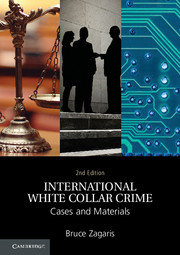Book contents
- Frontmatter
- Contents
- Preface
- 1 Introduction
- 2 Taxation
- 3 Money Laundering and Counterterrrorism Financial Enforcement
- 4 Transnational Corruption
- 5 Transnational Organized Crime
- 6 Export Control and Economic Sanctions
- 7 International Environmental Crimes
- 8 International Securities Enforcement
- 9 Extraterritorial Jurisdiction
- 10 International Evidence Gathering
- 11 Extradition and Alternatives
- 12 International Prisoner Transfer
- 13 The United Nations
- 14 The World Bank Group
- 15 INTERPOL
- 16 Economic Integration and Business Crimes
- Index
- References
3 - Money Laundering and Counterterrrorism Financial Enforcement
Published online by Cambridge University Press: 05 November 2015
- Frontmatter
- Contents
- Preface
- 1 Introduction
- 2 Taxation
- 3 Money Laundering and Counterterrrorism Financial Enforcement
- 4 Transnational Corruption
- 5 Transnational Organized Crime
- 6 Export Control and Economic Sanctions
- 7 International Environmental Crimes
- 8 International Securities Enforcement
- 9 Extraterritorial Jurisdiction
- 10 International Evidence Gathering
- 11 Extradition and Alternatives
- 12 International Prisoner Transfer
- 13 The United Nations
- 14 The World Bank Group
- 15 INTERPOL
- 16 Economic Integration and Business Crimes
- Index
- References
Summary
International Politics of Anti-Money-Laundering Regulations and Enforcement
One way to view the web of international agreements and arrangements governing anti-money-laundering (AML) regulations is to consider the international political overlay. This is best done by considering the international regulatory and enforcement agreements and arrangements on the universal and regional levels developed to construct AML regulatory and enforcement regimes.
A. Universal Organizations
Universal organizations refer to international organizations whose membership is universally based.
The United Nations
The United Nations pioneered international AML cooperation with the 1988 Vienna Convention against Illicit Traffic in Narcotic Drugs and Psychotropic Substances, which requires signatories to criminalize money laundering and immobilize the assets of persons involved in illegal narcotics trafficking. Because this convention was an initial effort and the participating governments were so diverse, there are differences in each country's criminalization of money laundering, extent of scienter required, enforcement methods, number of convictions, and range of punishments. Nevertheless, subsequent efforts have drawn from the Vienna Convention and wherever possible use the same terminology and systematic approach.
The 1999 International Convention for the Suppression of the Financing of Terrorism prohibits direct involvement or complicity in the international and unlawful provision or collection of funds, attempted or actual, with the intent or knowledge that any part of the funds may be used to carry out any of the offenses described in the convention, such as acts intended to cause death or serious bodily injury to any person not actively involved in armed conflict in order to intimidate a population, and any act intended to compel a government or international organization to take action or abstain from taking action. Offenses are deemed to be extraditable crimes, and signatories must establish their jurisdiction over the offenses, make them punishable by appropriate penalties, take alleged offenders into custody, prosecute or extradite violators, cooperate in preventive measures and countermeasures, and exchange information and evidence needed in related criminal proceedings.
- Type
- Chapter
- Information
- International White Collar CrimeCases and Materials, pp. 62 - 104Publisher: Cambridge University PressPrint publication year: 2015

